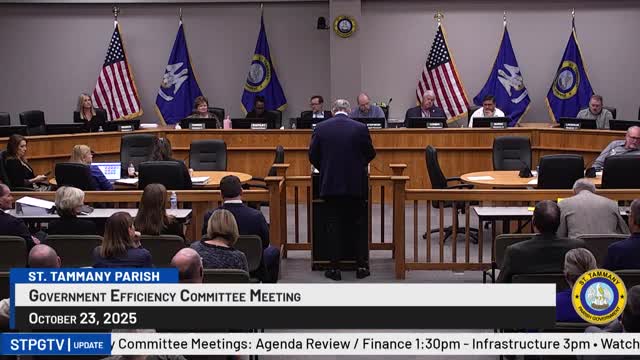Review finds Mosquito Abatement District spending outpaces peers; committee considers consolidation
Get AI-powered insights, summaries, and transcripts
Subscribe
Summary
An analysis presented to the St. Tammany Parish efficiency committee found the Mosquito Abatement District holds millions in assets, operates an in-house lab and aircraft program, and may cost taxpayers more than comparable parishes; presenters recommended bringing the district under parish government for oversight and potential savings.
An analysis presented Tuesday to the St. Tammany Parish Council’s efficiency committee concluded the Mosquito Abatement District operates with large cash reserves, costly capital assets and recurring expenses that may be redundant with parish services, and recommended the council consider consolidating the district under parish government.
The presentation was made by Elizabeth Othman, an assistant district attorney for St. Tammany and Washington parishes, and a local business work group led by Kyle France. Othman told the committee, “The public is not going to give the parish any more money. And I don't think that they should,” and said the review focused on the district to illustrate broader structural funding issues across special taxing districts.
The report, which committee members said is posted on the parish website, shows the Mosquito Abatement District budgeted about $9.9 million for 2025 and projects $9.6 million in collections this year on a 3.1 millage rate. The district’s audited 2024 statements list more than $40 million in total assets, including aircraft and a new laboratory the report says cost at least $7.64 million to construct. The district purchased a helicopter in 2021 for just over $4 million and owns two fixed-wing aircraft (one listed at about $3.5 million and another at about $645,000). The presentation states the helicopter flew 41 hours on spray missions in 2024 (20 missions), and that the district paid about $152,000 a year in aircraft-related insurance.
Othman and the work group identified recurring lab and research personnel costs of about $555,000 per year, and said the district now performs in-house mosquito testing at an internal cost of $12 per test versus the roughly $5.50 per test the LSU laboratory charged previously. The report also lists average full-time compensation (excluding the executive director) of roughly $117,000, 30 full-time employees, seven part-time and 21 seasonal staff, and employee benefits that include payment of health premiums for employees and dependents. The presentation flagged travel and conference spending, salary-survey-driven raises, and other expenses the work group described as excessive or redundant with parish services.
“We are clearly overspending when we look at these numbers,” Kyle France, chair of the business work group, told the committee, urging an orderly consolidation process rather than a “blame game.” Jack Donahue, a former Louisiana state senator who joined the panel, said elected officials should control budgets: “You need control over that budget,” Donahue said, arguing the council’s direct control currently covers only a small share of total taxpayer dollars.
Representatives of the Mosquito Abatement District did not give a presentation at the committee meeting. A former district board member, Terry Louis Stevens, spoke during public comment and disputed the framing, saying the district has complied with Louisiana law and that dedicated millage funds were approved by voters. Stevens also criticized the DA's office for producing the report while noting the district’s statutory authority (she cited Louisiana Revised Statute 3:377.22) and defended the district’s scientific staffing and national reputation.
Committee members and the presenters cited comparisons with other parishes. The work group reported St. Tammany’s mosquito budget is higher than similar parishes — listing St. Tammany at about $9.9 million for the year versus Calcasieu at about $6.5 million — and estimated outsourcing aerial services could cost roughly $971,000 at one contract rate. The presenters estimated potential recurring savings of at least $2.2 million if redundant functions were consolidated with parish government and suggested one-time recoveries from selling or leasing assets could be substantial.
No formal vote was taken on consolidating the Mosquito Abatement District. Instead the committee agreed to continue the efficiency review process; Councilman Arthur Laughlin moved to direct the committee to study public works as the next area for an efficiency review. The motion passed on a voice vote with Councilmembers Seiden, Tanner, Corbin, Burke and Laughlin recorded as voting yes.
The district attorney’s office and the business work group said their role was to gather and present data; they repeatedly emphasized the intent was to examine structural funding and oversight, not to single out individuals. Othman said the DA’s office undertook the review because the parish council lacks staffing resources to perform an in-depth analysis. “If we all agree that there won't be any new money coming in and that citizens should not be asked to pay more in taxes, then we have a responsibility to look inward and examine how we are using the money that currently exists,” she said.
Committee members asked follow-up questions about whether assets such as the lab or aircraft could be sold or leased and whether LSU’s accredited laboratory could resume testing if the district outsourced again; presenters answered that the lab property had an estimated resale value between $6 million and $8 million and noted LSU is accredited by the American Association of Veterinary Laboratory Diagnosticians and could expedite tests if requested. Several council members and presenters framed the work as an attempt to match limited taxpayer funds to core public safety and court-related obligations the parish must fund.
The efficiency committee said it will continue review of special districts and consider options including consolidation, outsourcing specific services, or other structural changes. The DA’s office and the business work group offered to assist further with document review and next steps. The Mosquito Abatement District’s formal budgets, minutes and other records cited in the presentation are posted on the parish’s website, the presenters said.
Votes at a glance: - Motion to direct the efficiency committee to study Public Works as the next department to review (mover: Councilman Arthur Laughlin; second: Councilman Burke). Voice vote passed (Seiden, Tanner, Corbin, Burke, Laughlin recorded as yes).
